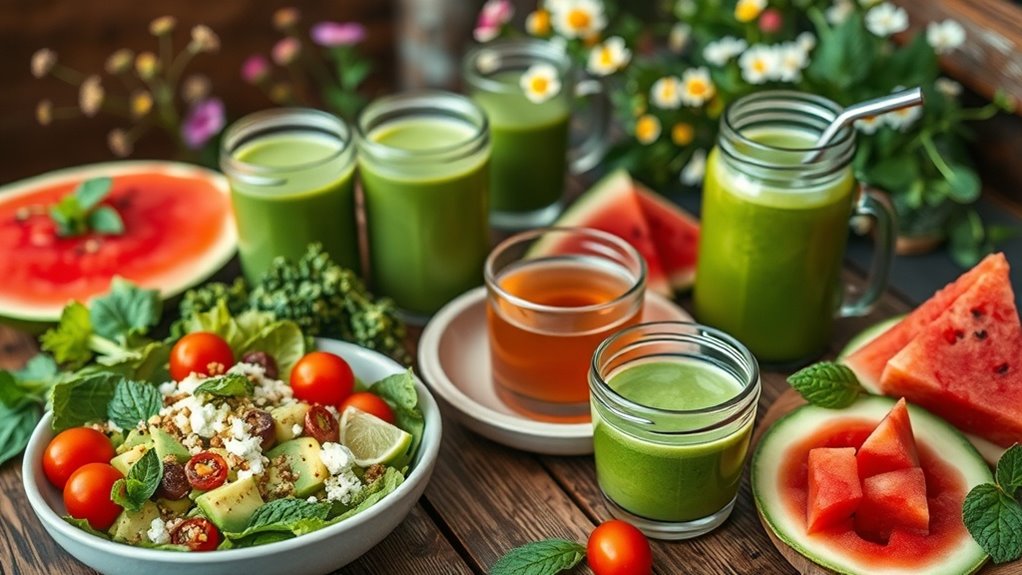The Best May Foods to Help You Recover From Overeating
If you’ve overindulged this May, you’re not alone; many people struggle with post-feast recovery. Focusing on leafy greens, probiotic-rich foods, and hydrating fruits can help you bounce back. By incorporating whole grains and lean proteins, you can promote sustained energy and muscle recovery. Curious about the specifics of these food choices and how they can benefit your digestion? Let’s explore the best options to support your body in feeling its best again.
Leafy Greens for Digestive Health
When you’ve overindulged, incorporating leafy greens into your meals can significantly improve your digestive health.
Foods like spinach, kale, and arugula are rich in fiber, which aids digestion and helps regulate bowel movements.
They also provide essential nutrients that support gut health, making them ideal overeating recovery foods. Additionally, their detoxifying properties enhance liver efficiency for waste processing and elimination.
Add these greens to smoothies, salads, or stir-fries for a nutritious boost.
Probiotic-Rich Foods for Gut Balance
To restore gut balance after overeating, incorporating probiotic-rich foods is essential. Fermented foods like kimchi, sauerkraut, and kefir not only support digestion but also enhance your overall gut health. Additionally, exploring various yogurt options can boost your probiotic intake while offering a delicious way to aid recovery. Including whole grains in your diet can also promote healthier digestion and help maintain gut health.
Fermented Foods Benefits
Fermented foods offer a treasure trove of benefits, particularly for gut health. Including these foods in your diet can enhance digestion and restore balance to your gut microbiome.
Here are three key benefits:
- Boosts nutrient absorption.
- Supports immune function.
- Reduces inflammation.
Incorporating fermented foods like kimchi and sauerkraut can significantly improve your overall well-being after overeating.
Yogurt Varieties to Try
Including probiotic-rich foods like yogurt in your diet can further enhance gut balance after excessive eating.
Try Greek yogurt for its higher protein content, or opt for kefir, a fermented drink that packs even more probiotics.
Look for yogurts with live cultures and minimal added sugars, as these support digestion and gut health, helping you recover more effectively from those overeating episodes.
Hydrating Fruits to Reduce Bloating
When you’re feeling bloated after overeating, turning to hydrating fruits can be a game changer. Water-rich options like watermelon and cucumber not only help with hydration but also promote digestion. Additionally, fiber-packed and natural diuretic fruits, such as berries and oranges, can aid in reducing that uncomfortable feeling. Incorporating hydrating vegetables like cucumbers significantly enhances fluid balance and alleviates bloating.
Water-Rich Fruits
Hydration plays a crucial role in alleviating bloating, and incorporating water-rich fruits into your diet can make a significant difference.
These fruits aren’t only refreshing but also help flush out excess sodium and reduce water retention.
Here are three top choices:
- Watermelon
- Cucumber
- Strawberries
Enjoy these fruits to boost hydration and tackle bloating effectively!
Fiber-Packed Options
After enjoying water-rich fruits to hydrate your body, it’s time to focus on fiber-packed options that can help ease bloating.
Foods like chia seeds, legumes, and whole grains provide soluble fiber that promotes digestion.
Additionally, vegetables such as broccoli and Brussels sprouts are beneficial too.
Incorporating these fiber-rich options into your meals can help reduce discomfort and support your gut health effectively.
Natural Diuretics
To combat bloating effectively, incorporating natural diuretics into your diet can be a game-changer.
These hydrating fruits help flush excess water from your system and can ease discomfort.
Consider adding these to your meals:
-
Watermelon – Rich in water and potassium.
-
Cucumber – Low in calories, high in hydration.
-
Pineapple – Contains bromelain, which aids digestion.
Stay refreshed and reduce bloating!
Whole Grains for Sustained Energy
When you’re looking to recover from overeating, incorporating whole grains into your diet is a smart choice for sustained energy.
They’re rich in fiber, which helps stabilize blood sugar levels, preventing energy crashes.
Opt for quinoa, brown rice, or whole wheat bread.
These foods fill you up without added sugars, leading to longer-lasting energy and keeping your cravings in check. Including a variety of whole grains in your meals can help improve overall health by providing essential vitamins, minerals, and a steady source of energy.
Lean Proteins for Muscle Recovery
In addition to whole grains, lean proteins play a vital role in muscle recovery following overeating. They help repair muscle fibers and promote growth.
Here are three excellent sources:
- Chicken breast – low in fat and high in protein.
- Turkey – rich in essential amino acids.
- Fish, like salmon – packed with omega-3s that reduce inflammation.
Including Greek Yogurt in your diet can also enhance protein intake and support gut health, further aiding recovery.
Incorporate these into your meals for optimal recovery.
Herbal Teas for Soothing Digestion
Peppermint tea aids in alleviating bloating and discomfort, while ginger tea can reduce nausea and promote digestion. Chamomile tea relaxes the digestive tract, helping to ease cramps. You might also consider fennel tea, known for reducing gas and bloating. These herbal options are both calming and effective for post-meal recovery. Additionally, incorporating detoxifying herbal teas can further support your digestive health and overall well-being.

